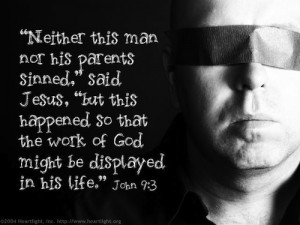Why Experts Get It Wrong
Sermon on John 9 by Rev. Steven McClelland. Focus on why religious experts don’t know God and why Jesus uses civil disobedience to get the public’s attention.
When the question was posed to Jesus ages ago, it was the same basic question we face today: Who sinned that this child should be marginalized and excluded from full participation in society as a person of sacred worth? Jesus’ answer then is just as relevant today: No one sinned, and no one deserves to be excluded.
Under the Pharisaic codes of purity and cleanliness, a person with a physical or mental disorder was someone with a sinful condition, which threatened the religious integrity and spiritual cleanliness of the entire community. For those misfortunate enough to have been born blind, disabled or emotionally disturbed meant being excluded from all of the rights and privileges of citizenship within the community. In effect sinners were excommunicated from life in the community and forced to beg to support themselves.
In effect, the blind man represented to the Pharisees what the black man did to the segregationists; someone, who was different and thus sinful. Someone who should be excluded from full participation in the larger community.
Now these were the best and the brightest of their day. To be a Pharisee meant you were at the top of social acceptance and admiration. Yet these experts, these scholars of God’s word never get it right. They may have gotten the orthodoxy of what they had been taught correct, but they did not get God. They did not know God. They did not experience God and that is their biggest problem.
By restoring the man’s sight, Jesus is publically defying and challenging the popular Pharisaic definition of who is pure and who is unclean. But as far as they are concerned Jesus is not just challenging a popular interpretation of Torah, Jesus is challenging God himself.
By healing the man, Jesus is engaging in a symbolic action directed as much at the legal system of his day as it is to the individual whose sight is restored. Jesus is engaging in an act of civil disobedience.
Over the wrath of the Pharisees, who want this radical dead, Jesus continues to make it clear through every subversive healing act of his that the Sabbath, was made for human beings and not we for the Sabbath.
When Jesus heals someone he threatens those who see themselves in charge because Jesus exposes all the ways we seek to define ourselves by excluding others. He exposes how wrong it is to claim that its from God in the first place
And so the blind man went as Jesus had told him to the pool of Siloam, which means sent, and he came back seeing. At last this man saw what the disciples, what his family, and what the Pharisees could not see. He saw that he was created by God as one loved for who he was and now takes his rightful place as one who has been sent back into the larger community as an equal to those who would have marginalized him.
Now, in telling this story John has chosen the Greek word – Typhlos to describe the man’s condition at the beginning of the story. It’s a term he will later use to describe the Pharisees’ condition at the end of the story.
Typhlos means, “that which is without access to light,” as in a blind alley or that which unable to perceive truth. Once Jesus anoints the man’s eyes with spit and mud John tells us that the man now sees – Blepo is the Greek verb that John uses to indicate what the blind man now sees.
It’s not just that the blind man sees. It’s also that the blind man now sees with insight. Something that John tells us that Pharisees now lack.
When Jesus heals this man Jesus is saying, regardless of how the man became blind, regardless, this is an opportunity for God’s glory to shine through. It’s a chance to bring someone back from being excluded. It’s a chance to make someone whole. Who cares whether it happens on a Saturday or a Sunday? That it happens is the issue.
The good news for this man, and for us, lies in the fact that once he sees that God has healed him he begins witnessing and testifying to the authorities from his experience, which is always more powerful than something you read in a book. This the Pharisees can not stand because his experience contradicts everything they hold true. They believe more in dogma than they do in people. That is the major difference between Jesus and the Phariees.
As the head of our church, Christ calls us to see the forces that dehumanize and marginalize us and others, both here and throughout the world. No human structure, be it religious or political or social is sacred. No law is above the law of love for God, neighbor and self.
Laws and institutions, whether religious or political, are for the maintenance of order and stability. They do not bring about or create life. They have a vested interest in seeing that things remain as they are.
Jesus was crucified by the religious and political leaders of his day for disrupting the accepted practices and laws governing his society. He was crucified for giving the disenfranchised the ability to see their worth apart from the pharisaic laws of purity and cleanliness.
But the powers of death could not stop God’s will that life triumph over death. And the resurrection is God’s commentary on all temporal authority. The resurrection says, “Yes” to life and “No” to any policy or theology that dehumanizes another person. God insists that grace is more fundamental to life than law. Amen


Pleasing you should think of somnthieg like that